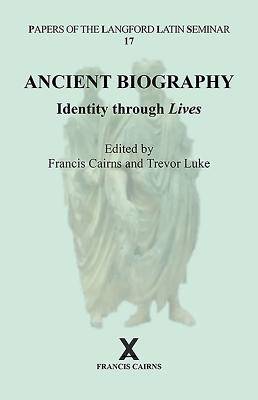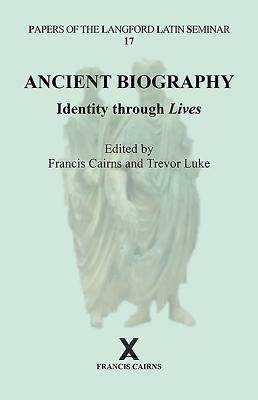
- Afhalen na 1 uur in een winkel met voorraad
- Gratis thuislevering in België vanaf € 30
- Ruim aanbod met 7 miljoen producten
- Afhalen na 1 uur in een winkel met voorraad
- Gratis thuislevering in België vanaf € 30
- Ruim aanbod met 7 miljoen producten
Zoeken
Ancient Biography
Identity Through Lives
€ 83,95
+ 167 punten
Omschrijving
The narration of lives (bioi) is pervasive in ancient written texts, but there has been comparatively little recent research into the genre of biography, perhaps because it has so many diverse forms and functions. From the Homeric nostos of Odysseus and the personal anecdotes captured in archaic Greek lyric to the 'biostructuring' of the Historia Augusta, the human experience has left its imprint over the entire span of Greek and Roman literature, philosophy and history. The 2015 Langford International Colloquium at Florida State University, Narrating Lives: Biography and Identity in Antiquity, brought together a diverse group of American and European scholars to explore the use of lives in the literary construction of both group and individual identities. The present volume contains revised versions of most of the papers given then, along with contributions invited from other scholars in the fields of biographical writing and identity. A combined bibliography and indexes are included.
The volume is divided into four parts, corresponding to different aspects of biographical identity.
Biography and Cultural Identity: the lives of Greek poets, specifically Pindar, are explored by Flore Kimmel-Clauzet in terms of the competitive tensions between different Greek cities; Rex Stem looks at how a Roman writer of Lives, Cornelius Nepos, looked in a non-culturally biassed way at non-Romans such as the Theban Pelopidas and the Carthaginian Hannibal; and David Rohrbacher assesses the function of ethnographic descriptions and religious identities in the Historia Augusta.
Biography and Power: Marcaline Boyd's analyses the rise to power of the Samian tyrant Polycrates as recounted by Herodotus and Polyaenus; Alexander Skufca examines Nepos's contrasting treatments of the Syracusan tyrants Dion and Timoleon; Cynthia Damon looks at how Suetonius characterizes the Caesars through narrations of their deaths.
Biography, Identity and Religion: Federicomaria Muccioli gives a useful brief history of divinisation in biographical writing and discusses Plutarch's depiction of ruler cult in these terms; Daniel Harris-McCoy deals with accounts of dreams in biographical works and their influence on Artemidorus; Jennifer Rea compares the ways in which women are biographized, the early Christian martyr St. Perpetua, and the twentieth-century Christa McAuliffe, who lost her life in the Challenger disaster; Matthew Ferguson considers eschatological elements in the Alexander Romance, a late-antique highly fictionalized version of the life of Alexander the Great.
Greek Lives under Roman rule: Alexei Zadorojnyi identifies the way in which very highly condensed 'Lives', for which he uses the term 'biographical synecdoche', serve interesting functions within biographical works; Andrew Scott writes about the tensions which arise in Cassius Dio from the fact that he was sometimes a participant in the history he relates; Svetla Slaveva-Griffin is also interested in the relation between biography and real life, and looks in great detail at how this is worked through in the tradition of NeoPlatonic biography
Part of two series:
ARCA, Classical and Medieval Texts, Papers and Monographs. No. 54
Papers of the Langford Latin Seminar. No. 17
The volume is divided into four parts, corresponding to different aspects of biographical identity.
Biography and Cultural Identity: the lives of Greek poets, specifically Pindar, are explored by Flore Kimmel-Clauzet in terms of the competitive tensions between different Greek cities; Rex Stem looks at how a Roman writer of Lives, Cornelius Nepos, looked in a non-culturally biassed way at non-Romans such as the Theban Pelopidas and the Carthaginian Hannibal; and David Rohrbacher assesses the function of ethnographic descriptions and religious identities in the Historia Augusta.
Biography and Power: Marcaline Boyd's analyses the rise to power of the Samian tyrant Polycrates as recounted by Herodotus and Polyaenus; Alexander Skufca examines Nepos's contrasting treatments of the Syracusan tyrants Dion and Timoleon; Cynthia Damon looks at how Suetonius characterizes the Caesars through narrations of their deaths.
Biography, Identity and Religion: Federicomaria Muccioli gives a useful brief history of divinisation in biographical writing and discusses Plutarch's depiction of ruler cult in these terms; Daniel Harris-McCoy deals with accounts of dreams in biographical works and their influence on Artemidorus; Jennifer Rea compares the ways in which women are biographized, the early Christian martyr St. Perpetua, and the twentieth-century Christa McAuliffe, who lost her life in the Challenger disaster; Matthew Ferguson considers eschatological elements in the Alexander Romance, a late-antique highly fictionalized version of the life of Alexander the Great.
Greek Lives under Roman rule: Alexei Zadorojnyi identifies the way in which very highly condensed 'Lives', for which he uses the term 'biographical synecdoche', serve interesting functions within biographical works; Andrew Scott writes about the tensions which arise in Cassius Dio from the fact that he was sometimes a participant in the history he relates; Svetla Slaveva-Griffin is also interested in the relation between biography and real life, and looks in great detail at how this is worked through in the tradition of NeoPlatonic biography
Part of two series:
ARCA, Classical and Medieval Texts, Papers and Monographs. No. 54
Papers of the Langford Latin Seminar. No. 17
Specificaties
Betrokkenen
- Uitgeverij:
Inhoud
- Aantal bladzijden:
- 310
- Taal:
- Engels
- Reeks:
- Reeksnummer:
- nr. 55
Eigenschappen
- Productcode (EAN):
- 9780995461215
- Verschijningsdatum:
- 29/08/2018
- Uitvoering:
- Hardcover
- Formaat:
- Genaaid
- Afmetingen:
- 137 mm x 218 mm
- Gewicht:
- 557 g

Alleen bij Standaard Boekhandel
+ 167 punten op je klantenkaart van Standaard Boekhandel
Beoordelingen
We publiceren alleen reviews die voldoen aan de voorwaarden voor reviews. Bekijk onze voorwaarden voor reviews.










